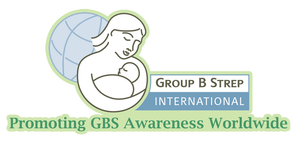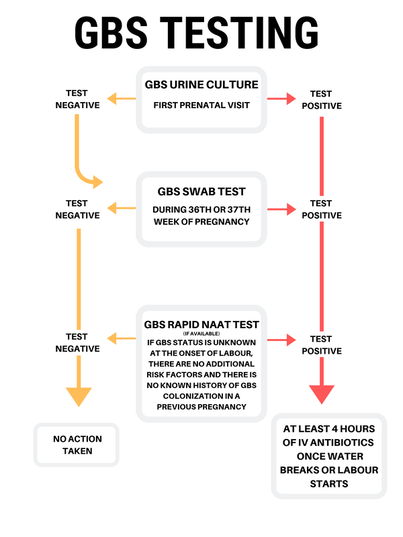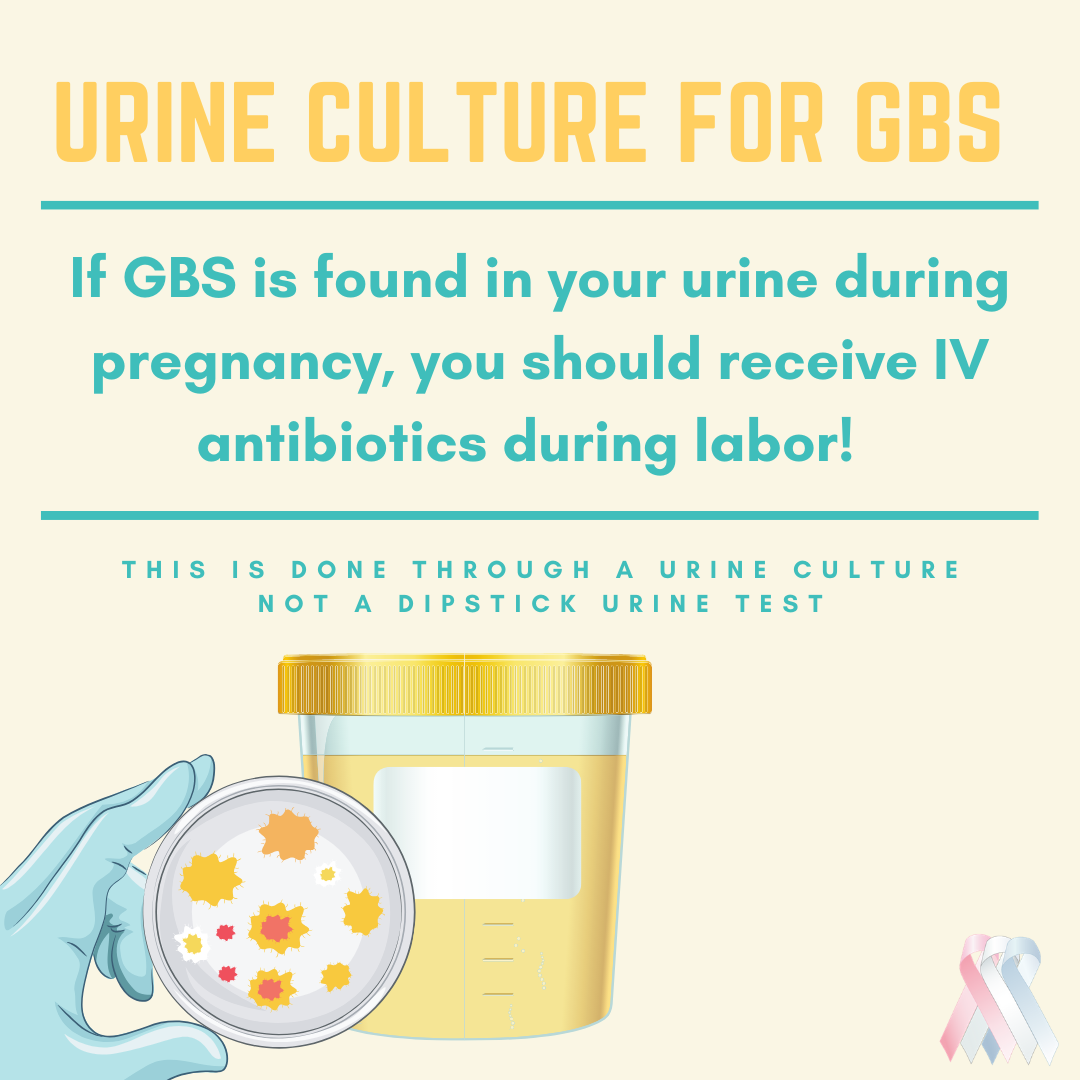Group B Strep Testing
|
Approximately 1 in 4 pregnant individuals carry group B strep (GBS), the leading cause of sepsis and meningitis in newborns according to the US Centers for Disease Control and Prevention (CDC). GBS can also infect babies during pregnancy and the first few months of life.
Not all babies exposed to GBS become infected, but, for those who do, the results can be devastating. GBS can cause babies to be miscarried, stillborn, born prematurely, become very sick, have lifelong handicaps, or die. Even babies born to a those who tests negative can become infected by group B strep. Fortunately there are ways to help protect babies from group B strep disease, such as testing for group B strep during pregnancy! Knowing your GBS status can help you and your healthcare providers take adequate steps to help protect your baby. |
Urine Culture
|
Ideally, your provider should do a urine culture for group B strep (GBS) and other bacteria (this is not the standard prenatal urine “dipstick” check) at your first prenatal visit. Having group B strep in your urine is a risk factor associated with early-onset GBS disease. If your urine tests positive, your provider should consider you as “GBS colonized” for this pregnancy so that you receive IV antibiotics for GBS when labor starts or your water breaks.
If you have urinary symptoms or a significant level of GBS in your urine, your healthcare provider should prescribe oral antibiotics at the time of diagnosis. We advocate for a recheck ("test of cure") one month after treatment. |
A GBS urine test:
GBS urine test is a culture. In a urine culture is a test to find germs in the urine can can cause an infection, since the urine in the bladder is typically sterile. Bacteria may enter the urethra and cause infection. The test is completed by adding urine to a substance that promotes the growth of germs. A sample of urine is added to a substance that promotes the growth of germs. If no germs grow, the culture is negative. If germs grow, the culture is positive. The type of germ may be identified using a microscope or chemical tests.
Be sure to ask for the results of your urine culture
A dipstick test:
It is a test where a plastic strip is dipped into urine. The plastic strip is treated with chemicals that will react and change colors depending on levels in the urine. This test does not react to GBS levels. It can react to pH, protein, glucose, white blood cells, bilirubin, and blood. This test does not react to GBS levels.
GBS in a baby’s urine:
GBS urine test is a culture. In a urine culture is a test to find germs in the urine can can cause an infection, since the urine in the bladder is typically sterile. Bacteria may enter the urethra and cause infection. The test is completed by adding urine to a substance that promotes the growth of germs. A sample of urine is added to a substance that promotes the growth of germs. If no germs grow, the culture is negative. If germs grow, the culture is positive. The type of germ may be identified using a microscope or chemical tests.
Be sure to ask for the results of your urine culture
A dipstick test:
It is a test where a plastic strip is dipped into urine. The plastic strip is treated with chemicals that will react and change colors depending on levels in the urine. This test does not react to GBS levels. It can react to pH, protein, glucose, white blood cells, bilirubin, and blood. This test does not react to GBS levels.
GBS in a baby’s urine:
- Late-onset GBS infection can less commonly present as a urinary tract infection (UTI).
- UTI in neonates can result from a blood stream infection OR by bacteria ascending through the urethra as it most often does in adults or older children.
- A low number of bacteria in a urine specimen is often considered a contaminant and not a true infection. Contamination occurs when the area is not completely sterilized prior to collection of urine. Bacteria that colonize the gastrointestinal tract (like GBS, E. coli, etc.) are frequently found in the diaper area and may show up in the specimen.
Group B Strep Swab Test
It is now the standard of care in the US for all pregnant individuals to be routinely tested for group B strep (GBS) during their 36th or 37th week during each pregnancy unless their urine already cultured positive in the current pregnancy or they have had a previous baby with GBS disease. (Since levels of GBS can change, each pregnancy can be different.) Your provider will perform a swab test of both your vagina and rectum and receive the test results in 2–3 days.
Get a copy of all culture test results and keep them with you! If the test result is positive, you should receive IV antibiotics when labor starts or your water breaks.
Inform your provider if you are using antibiotics and/or vaginal medications which may cause false negative results.(1)
It’s important to know that:
Get a copy of all culture test results and keep them with you! If the test result is positive, you should receive IV antibiotics when labor starts or your water breaks.
Inform your provider if you are using antibiotics and/or vaginal medications which may cause false negative results.(1)
It’s important to know that:
- A pregnant individual may test negative if her GBS colonization level at the time of the test was below the level of detection.
- A pregnant individual's GBS status can change so they could test negative but be colonized later in pregnancy and vice versa.
- Test results are considered to accurately (95%-98%) predict a pregnant individual’s colonization status at delivery if she delivers within 5 weeks of her test. They may need to be retested if she has not yet given birth within 5 weeks of being tested.
- After birth, a baby can become infected from sources other than the pregnant parent and >60% of early-onset cases occur to infants whose parent tested negative.
- You should tell your provider if you are allergic to penicillin and describe your reaction. There are IV antibiotic alternatives if necessary.
Rapid NAAT Testing
Some hospitals will offer rapid DNA-based tests which can be performed during labor or any time during pregnancy with results in just a few hours. These tests can help supplement your routine group B strep (GBS) testing because:
- Your GBS status can change by the time you go into labor.
- Culture tests can show a false negative.
- Your culture test results may not be available.
Join the Campaign against GBS Disease in babies! |
CONNECT TO GBSI |


